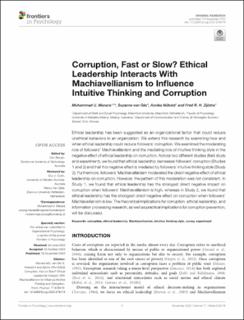| dc.description.abstract | Ethical leadership has been suggested as an organizational factor that could reduce unethical behaviors in an organization. We extend this research by examining how and when ethical leadership could reduce followers’ corruption. We examined the moderating role of followers’ Machiavellianism and the mediating role of intuitive thinking style in the negative effect of ethical leadership on corruption. Across two different studies (field study and experiment), we found that ethical leadership decreases followers’ corruption (Studies 1 and 2) and that this negative effect is mediated by followers’ intuitive thinking style (Study 2). Furthermore, followers’ Machiavellianism moderated the direct negative effect of ethical leadership on corruption. However, the pattern of this moderation was not consistent. In Study 1, we found that ethical leadership has the strongest direct negative impact on corruption when followers’ Machiavellianism is high, whereas in Study 2, we found that ethical leadership has the strongest direct negative effect on corruption when followers’ Machiavellianism is low. The theoretical implications for corruption, ethical leadership, and information processing research, as well as practical implications for corruption prevention, will be discussed. | |
